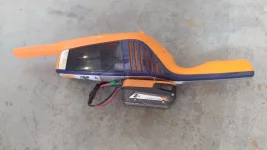A 4.0 ah battery likely has 10 cells. 2 parallel pairs of 5 cells in seriesBattery question. If a tool has two batteries of capacity X and 2X does it produce more power/torque using the 2X battery or is it identical and just goes about twice as long before going dead?
A 2.0ah battery likely has just 5 cells in series.
Each individual cell is rated for a maximum continuous discharge rate.
Usually on powertools this is no Less than 20 amps amperage, and a higher cdr is better, but high cdr cells, usually have half the rated capacity of the highest capacity cells which usually have a rather dismal cdr.
So in a 10 cell battery, each cell is providing roughly half the current as would a 5 cell battery when Powering the same load.
As a result, the voltage each cell retains whike powering that large load is higher on a 10 cell battery than on a 5 cell battery.
So the drill motor getting 19.5v under a 30 amp load from a 10 cell 4.0 ah baTtery, is going to have more torque than a 5 cell baTtery, that can only maintain 17.8v powering the same load.
Also there is the Peukert effect, which basically says the larger the electrical load the less total available capacity the baTtery will have.
So a larger capacity battery, will not only have more power, it will be affected to a much lesser degree than the smaller capacity battery, by the Peukert effect.
Since in a 10 cell, 5series 2parallel battery, each cell is providing half the amperage of a 5S battery, it will suffer far less from peukert effect, and heat up from within to a far lesser degree.
The 10 cell battery has 2x the capacity, so it can power the same large load, for at least 2x as long, and perhaps as much as 2.5x
And the larger capacity battery will heat less, and heat is a big enemy of battery longevity.
So while a 1.5 /2.0 ah battery is more than adequate for many tasks, there are few situations where the larger capacity will not only double +the times required between recharges, it will deliver higher voltage to the motor, for more torque/speed under load, and the higher the load the bigger the difference will be.
As the lithium battery pack accumulates cycles its performance will degrade.
How fast it degrades depends on how hot it gets, and averaGe temperature, and how hard it had to work when it worked hard, and the average state of charge.
LIthium batteries do not really want to be fulky charged ASAP, like lead acid batteries, which practically demand such, for good or better service life.
A 18v battery pack from ryobi, ridgid, makita, and dewalt, are charged to the 20.5v range, where if it were returned to true 100% state of charge it would read 2!.0v. Warm off the charger.
Most 3.6v nominal lithium cells spec 2.5v as the absolute minimum acceptable voltage, so 12.5v for a 5s or 5s2p "18v" battery. I noticed my ridgid 2.0 ah battery BMS shut down the Battery/tool at 14.39v yesterday, measured 30 seconds later. So 2.88v per cell, 30 seconds after load removal. Likely hit much closer 2.5v while under load.
In my observations of 18650, 21700,14500, and 16340 cells, voltage tanks fast after 3.25v is passed.
I suspect most power tool batteries are attempting to keep the battery a 10% to 95% state of charge range, to maximize cycle life, or at least last the warranty period.
I'm expending minimal efforts to keep my lithium batteries in the 20% to 80% range, and cool, and hope to never require the warranty, even with the registered Ridgids.

